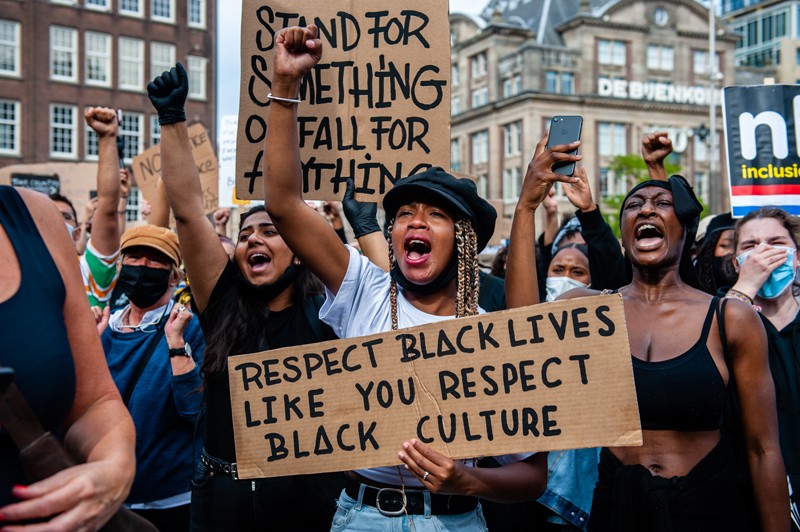
I’ve been chasing down as many of the antiracist groups in the lindy hop world as I can find. I want to make a list here, so people can have it as a resource. And by people I mean me, and by have, I mean share.
I’m thinking the groups that are specifically anti-racist in ideology and practice (rather than groups that have inclusive policies but other goals – eg Mobtown, Swingopedia, etc), and groups that focus on Black dance.
So far I’ve thought of:
- Balboa In Color
(FB group for balboa dancers of colour, focussing on balboa) - Black Lindy Hop Matters
(based in Baltimore, USA, including Black board members, focussing on linking up Black jazz dance resources) - Black Lindy Hoppers Fund
(based in the USA, Black board members, focussed on fund raising for Black artists and presenting dance workshops) - CVFC – Collective Voices for Change
(international group, including Black board members, focussing on presenting anti-racism talks) - Guardian Baltimore
(based in Baltimore, USA, Black board members, focussing on Black dance culture and history as a site for social change) - HellaBlackLindyHop
(based in USA, Black board, focussing on Black dance orsm) - Integrated Rhythm podcast (based in USA, including Black board members, focussing on discussing race and Black experience in jazz dance.) NB no website/fb, but podcast link
- MOVE TOGETHER: Dancing Towards Inclusivity & Global Social Justice
(based in the USA, including Black board members focussing on hosting discussion forums and fund raising) - Obsidean Tea (based in the USA, Black staff, focussing on Black culture and dance today)
I’ve also been thinking about what we do with all this information. There’s lots to read and learn, but integrating it in our teaching practice can be harder. Especially if you’re not teaching at the moment.
I’ve been thinking that it’s good to combine one of the practical dance classes with one of the talk-and-think classes. eg the Harlem Renaissance link from Guardian Baltimore with a tap dance class from Josette Wiggans; Black Lindy Hoppers Fund with Collective Voices for Change. There are also some great Black DJs doing sets at various online parties (Global Online Social, Track Town Swing’s online party, etc etc), and they frequently speak a few words between songs. And of course, there’s the Blues In a Flat fundraiser/collab with Maputo Swing.
I’m feeling it’s essential to get up and do something, rather than just thinking or listening. Thinking and listening quietly is a very Anglo-European (settler) approach to learning. Getting up learning-through-being-and-doing is a cornerstone of Black dance culture. Most of the modern lindy hop world prioritises white ways of learning, where the ‘lesson’ is spelled out explicitly. It’s worth undoing that by taking a class or dancing to a set with Black artists, to undo that.
So my feel, generally, is that simply ‘adding Black history’ to your dance class isn’t anti-racist. It doesn’t change anything. To be really anti-racist, you need to make radical paradigm changes. And the most important one of those is for teachers to take classes and to focus on learning. Because the idea that a teacher is beyond learning is not only a BIG problem, it’s also really dull.
As I write this stuff, I’m super conscious of who is reading, and who I am, writing. I am a white woman. So I need to engage with that in my own thinking and practice. It’s a sad fact that most of the members of this group are not Black. So most of us have a lot of work to do; most of us need to be questioning everything we think we know about lindy hop and about teaching.
But what if you are a Black teacher or dancer? I know that there is an argument for decolonising your own thinking, as a Black artist. That might mean unlearning the ways of teaching you’ve learnt as a student in white-run classes. Which carries with it all sorts of risks. And I do not want to encourage Black dancers to doubt themselves!
I feel supremely uncomfortable writing those sorts of suggestions, as a white woman aware of my power and privilege. But perhaps Audre Lorde’s piece ‘The Master’s Tools Will Never Dismantle the Master’s House’ is the best piece to read for more on that. I’d like to end by saying to Black dancers: trust yourself, and trust your history and culture. You know much more about it than someone like me does. And I’m happy to clear a space so you can do what you need to do.
nb this is a useful unit drawing together some of these ideas in Black feminist thinking.
